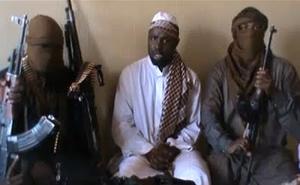TerrorismBoko Haram leader deposed following cease-fire agreement with Nigerian government
Sheikh Abubakar Shekau, the leader of Nigeria’s Boko Haram, appears to have been deposed by more moderate members of the Islamic group. The change of leadership follows a cease-fire agreement between the Islamic organization and the Nigerian government, reached in talks on 25-26 June. Violence has continued however, and Boko Haram, which since 2009 has been conducting an increasingly violent campaign against the Nigerian government and Western influence in the country, may split as more radical elements decide to create a new militia.

Abubakar Shekau flanked by two Boko Haram fighters // Source: laodong.com.vn
Sheikh Abubakar Shekau, the leader of Nigeria’s Boko Haram, appears to have been deposed by more moderate members of the Islamic group.
Shekau had led the group since July 2009, when the group’s founder, Imam Mohammed Yusuf, was captured and killed by Nigerian government forces.
Under Shekau, Boko Haram has become more radical, has adopted ever-more-violent tactics, and has identified more publicly with al Qaeda.
Following talks with the Nigerian government, which began toward the end of June, and a 26 June announcement of a cease-fire, Boko Haram has reduced its campaign of violence against the government and what the group regards as corrupting Western influence in Nigeria.
The Huffington Post reports that the violence has not stopped completely, though. Responding to what Boko Haram saw as government foot-dragging in implementing the cease fire agreement, the group detonated three car bomb attacks in the northern city of Kano this week, killing at least fifteen people.
The post-cease fire period also saw Boko Haram commit one of the more grisly attacks in its war: at the beginning of July, forty school students and a teacher were killed when Boko Haram militants attacked the Government Secondary School, a boarding school in Mamudo town in Yobe state in northeast Nigeria. The Islamists set the school dorm on fire while students, aged 10 to 15, were sleeping inside. Most of the dead were burned alive inside the dorm. The militant waited outside the dorm, and shot those who tried to escape the burning building (see “Nigerian Islamic extremists burn children alive during attack on boarding school,” HSNW, 8 July 2013).
. Abu Zamira Mohammad has been appointed new leader and has since appointed five representatives to lead peace negotiations with the Nigerian government: Abu Liman Ibrahim, Abu Zamira Mohammed, Abu Adam Maisandari, Kassim Imam Biu, and Mallam Modu Damaturu.
Boko Haram representative, Iman Liman Ibrahim, explained the decision to depose Shekau was due to the Yobe Massacre in which school children were murdered in cold-blood. “It was harsh, harsh, harsh. The beheadings, the killings, the recent deaths of students… this is not the way of the Holy Qu’ran. We could tolerate it no longer.” Liman said of Shekau’s actions.
Liman said Shekau was offered three options as leader of the group: peace deal, leave Boko Haram, or die. The fate of Shekau is unclear. A video, recovered from a Boko Haram camp in the Sambisa Forest Reserve in northeast Nigeria raided by the military on 16 May, shows Shekau limping, perhaps an indication that he was shot.
The move to depose Shekau could lead to a deepening conflict between moderates and extremists within Boko Haram. This may result in the breakup of the group and the emergence of a more extreme splinter organization which is unlikely to accept a ceasefire and other agreements reached in the 25-26 June talks with the Nigerian government.
